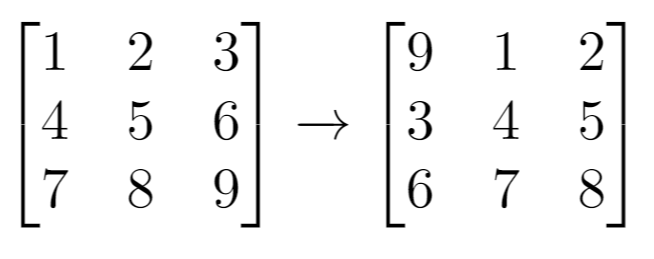描述
Given a 2D grid of size m x n and an integer k. You need to shift the grid k times.
In one shift operation:
- Element at grid[i][j] moves to grid[i][j + 1].
- Element at grid[i][n - 1] moves to grid[i + 1][0].
- Element at grid[m - 1][n - 1] moves to grid[0][0].
Return the 2D grid after applying shift operation k times.
Example 1:

Input: grid = [[1,2,3],[4,5,6],[7,8,9]], k = 1
Output: [[9,1,2],[3,4,5],[6,7,8]]
Example 2:
Input: grid = [[3,8,1,9],[19,7,2,5],[4,6,11,10],[12,0,21,13]], k = 4
Output: [[12,0,21,13],[3,8,1,9],[19,7,2,5],[4,6,11,10]]
Example 3:
Input: grid = [[1,2,3],[4,5,6],[7,8,9]], k = 9
Output: [[1,2,3],[4,5,6],[7,8,9]]
Note:
m == grid.length
n == grid[i].length
1 <= m <= 50
1 <= n <= 50
-1000 <= grid[i][j] <= 1000
0 <= k <= 100
解析
根据题意,无非就是每次的操作相当于将 grid 压爆成一维数组,然后看作首尾相连的环,将元素整体向后移动一位(最后一个元素自然成了第一个元素),然后再将这个数组的维度变为二维,然后操作 k 次即可。
解答
class Solution(object):
def shiftGrid(self, grid, k):
"""
:type grid: List[List[int]]
:type k: int
:rtype: List[List[int]]
"""
if k==0:
return grid
m = len(grid)
n = len(grid[0])
for _ in range(k):
result = [[0] * n for _ in range(m)]
for i in range(m):
for j in range(n):
if j!=n-1:
result[i][j+1] = grid[i][j]
elif i!=m-1 and j==n-1:
result[i+1][0] = grid[i][j]
else:
result[0][0] = grid[i][j]
grid = result
return grid
运行结果
Runtime: 604 ms, faster than 16.36% of Python online submissions for Shift 2D Grid.
Memory Usage: 13.5 MB, less than 99.09% of Python online submissions for Shift 2D Grid.
原题链接:https://leetcode.com/problems/shift-2d-grid